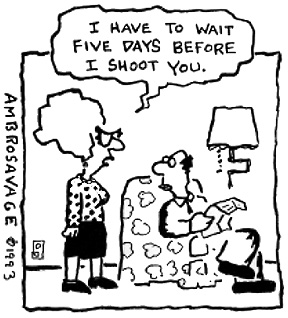by Mark Worth
"Americans are finally fed up with violence that cuts down another citizen with gunfire every 20 minutes. Guns are instruments of madness."
With violence-particularly firearm violence-speeding to the top of the American agenda, we are devoting much of this issue of The Free Press to an issue that many people thought should have been put to bed 30 years ago when President Kennedy was assassinated.
- 23,000 people are killed in the U.S. by firearms every year
- Being shot is the leading cause of death for black makes 15-24.
- More people are killed with firearms in Washington state than in Canada and England, which have a combined population 13 times that of our state.
 Most policy-makers say that it's these other gun owners for whom stricter gun controls are meant. At the same time, however, many a law-abiding gun owner - the poster child that the NRA props up as a victim of tighter gun laws - have been known to blow away a family member or friend or neighbor during an argument or misunderstanding that otherwise might have been settled by a fist fight. Instead, someone dies or is horribly wounded.
Most policy-makers say that it's these other gun owners for whom stricter gun controls are meant. At the same time, however, many a law-abiding gun owner - the poster child that the NRA props up as a victim of tighter gun laws - have been known to blow away a family member or friend or neighbor during an argument or misunderstanding that otherwise might have been settled by a fist fight. Instead, someone dies or is horribly wounded.
By themselves, laws do very little to deter someone from doing something bad. But they send a message. Stricter gun-control laws at the very least will establish a moral imperative for this country, just as moral judgments have been make about murder, theft, bribery, prostitution, even abusing donkeys. This is especially true for young people, who need to know that grown-ups have set a standard that guns are for killing, and that killing is no fun for anyone.
 |
 |
 |
 |
 |
Contents on this page were published in the December/Jan, 1994 edition of the Washington Free Press.
WFP, 1463 E. Republican #178, Seattle, WA -USA, 98112. -- WAfreepress@gmail.com
Copyright © 1993 WFP Collective, Inc.
